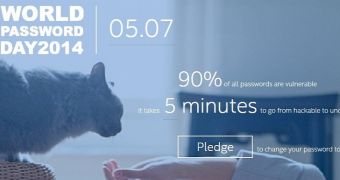Today is World Password Day, a holiday that’s here to remind us that our privacy is as safe as we make it be.
The day was first created by Intel Security and support for the idea has picked up. There are currently some 170 organizations, including Toshiba, Dell and Microsoft, and they’re asking Internet users to make sure that they change their passwords.
The concept came as Intel was thinking about a security education program. It’s not exactly a secret that people don’t change their passwords as the years go by, even though servers may fall prey to hackers and data can be stolen.
Given the recent Heartbleed incident, it’s perhaps more important than ever to make sure that your online data is safe. In order to obtain this, you have to change your password, make sure it contains lower case and upper case letters, numbers and symbols. You should also make sure to set up a different password for every account you have and even set up two-step authentication if supported, to ensure that you have the best protection available.
The Password Day website comes with a few pieces of great advice. For instance, you should probably use a password manager if you have a lot of online accounts, and also to set up different ones for bank, email and other sites.
You are also advised not to use one-word passwords and to avoid introducing any dates or facts about you that can be found online.
It’s important that you choose length over complexity, Intel points out. “Any complex eight-character password can be cracked in 5.5 hours. The password ‘thunder showers at sunset’ would take more than a million years to crack,” Intel claims.
To make things even more difficult for those who are way more curious than they should be, you should also make sure to go through the process of changing your passwords on a regular basis, meaning that you should do this at least a few times a year. This may seem strenuous, but in the end, it’s your security at stake.
The site incorporates a game called “Password Blaster,” which is a mix between Space Invaders and a spelling exercise that you should definitely try if you have a few spare minutes. If you share the “Password Blaster” and follow @IntelSecurity on Twitter, on May 7, your Twitter handle will be added in the game.
Will you change your passwords today?

 14 DAY TRIAL //
14 DAY TRIAL //